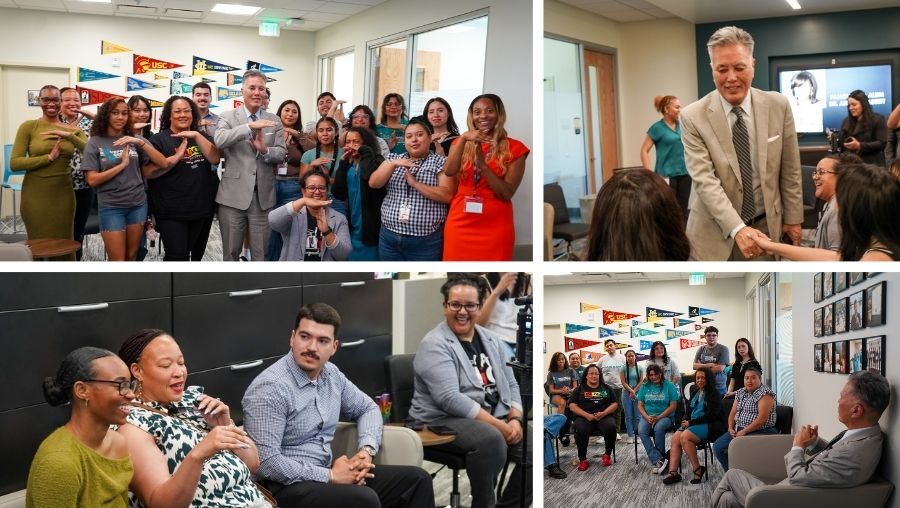Congressman Mark Takano Visits Moreno Valley College to Hear TRIO Success Stories Amid Federal Funding Uncertainty

On Friday, May 9, U.S. Representative Mark Takano (CA-39) visited the TRIO Support Services Center at Moreno Valley College (MVC) to listen to student and alumni stories about the transformative impact of TRIO programs—federally funded initiatives that support first-generation, low-income, and disabled students in achieving higher education success.
The roundtable discussion included more than a dozen TRIO participants, parents, and staff who shared personal stories of perseverance, academic success, and the program’s life-changing support. With federal funding for TRIO programs currently under debate in Washington, the visit highlighted the program’s vital role in communities like Moreno Valley.
Takano praised the program and those it serves, calling TRIO “a hero” and celebrating its generational benefits.
“Money should never be the reason why someone can’t go to college,” Takano said. “It makes me very proud to see students from our community succeeding in science and technology. Programs like TRIO are what make America great.”
TRIO comprises eight federally funded programs that support low-income individuals, first-generation college students, and students with disabilities. At MVC, five of these programs serve more than 1,000 families annually under the leadership of Micki Grayson, director of TRIO Support Services, supporting students from middle school through college.
Grayson, a lifelong TRIO advocate with more than 30 years of experience, said the program not only transforms individual lives but also uplifts families and communities.
“TRIO is near and dear to my heart,” said Grayson. “It’s not just about one student—it’s about changing the trajectory for entire families.”
Personal Stories of Impact
TRIO student testimonies painted a vivid picture of the program’s far-reaching influence.
Genesis, a TRIO alum who graduated from a four-year university and is now heading to UC Medical School with aspirations to work for the Centers for Disease Control and Prevention, said the program gave her a path when she had none. Takano responded, “We need young people like you who understand why this is important.”
Melissa, a student at Humboldt State and a mother of three, credited TRIO with helping her escape a domestic violence situation and build a future for her family.
“Without TRIO, this would have been difficult. We would be lost,” she said. “Now I have all the support in the world.”
Bertha, who entered TRIO in middle school and is now studying music education at MVC, shared how the program made it possible to follow her passion despite cultural expectations to pursue manual labor jobs.
Antonio, a TRIO alum currently in his final year at Cal Poly Pomona majoring in Electrical Mechanical Engineering, said he plans to work with the Department of Water and Power. Outside of school, he mentors and tutors younger TRIO scholars to give back to the program that helped him achieve his current success.
Danielle, who overcame housing insecurity and a troubled household, credited the program with changing her family’s future.
“It wasn’t just the reason I got through college—it’s why my daughter’s life looks entirely different from mine,” she said. “That’s the generational impact of this support system.”
Abraham shared how TRIO completely changed his academic path.
“I had a 1.9 GPA before I was introduced to TRIO. Within a year, my grades jumped to honor roll status because of their support. TRIO helped me graduate high school and pushed me to grind hard—so I did. I started at MVC in computer programming and eventually earned my undergraduate degree in software engineering and biochemistry. Now, I’m working on my master’s in biochemistry. I couldn’t have done any of this without TRIO helping me lock in and stay focused.”
Abraham now works in the MVC Maker Space as a lab technician with hopes of pursuing his doctorate. Takano was visibly moved, remarking, “The future of our country is at stake. Discovering your story and your future doctoral research is one of the stories that will pay out many times over compared to the investment made in the form of TRIO.”
A Call for Continued Advocacy
Roosevelt Charles, Ed.D., vice president of student services at MVC, urged attendees to continue sharing their stories.
“TRIO works. It’s proven, year after year,” he said. “Behind every data point is a person, a family, a community. We must continue to advocate and make sure those in power understand the depth of this impact.”
Dean Sandra Martinez echoed the sentiment, adding, “We're here because we’re committed to supporting students, and we need continuous advocacy at the highest levels.”
Takano assured attendees that, although the President’s proposed budget eliminates TRIO, he did not believe Congress would let that happen.
“It’s not the end of the story,” he said. “But it is a dicey time. Hearing directly from you gives me more to take back to my colleagues across the aisle.”
For many in the room, showing up meant taking time off work, driving in traffic, or arranging childcare—but the consensus was clear: TRIO is worth fighting for.
As one parent, Jade, put it: “This program has been such a blessing. My daughter says, ‘I’m destined to succeed.’ And thanks to TRIO, I believe her.”
Her words echoed the collective sentiment in the room—that the future of TRIO isn’t just a policy decision; it’s a matter of opportunity and equity for families across the country. For Takano, these stories serve as more than inspiration—they're a call to action.
If you have a TRIO success story you would like to share, please email us at news@mvc.edu.